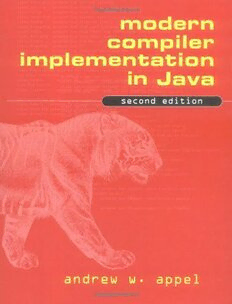
Modern Compiler Implementation in Java, 2Ed PDF
513 Pages·2002·2.165 MB·English
Most books are stored in the elastic cloud where traffic is expensive. For this reason, we have a limit on daily download.
Preview Modern Compiler Implementation in Java, 2Ed
Description:
This textbook describes all phases of a compiler: lexical analysis, parsing, abstract syntax, semantic actions, intermediate representations, instruction selection via tree matching, dataflow analysis, graph-coloring register allocation, and runtime systems. It includes thorough coverage of current techniques in code generation and register allocation, and the compilation of functional and object-oriented languages. The most accepted and successful techniques are described and illustrated with actual Java^TM® classes. The first part is suitable for a one-semester first course in compiler design. The second part; which includes the compilation of object-oriented and functional languages, garbage collection, loop optimization, SSA form, instruction scheduling, and optimization for cache-memory hierarchies; can be used for a second-semester or graduate course. This new edition includes more discussion of Java and object-oriented programming concepts such as visitor patterns plus a new Mini-Java programming project. A unique feature is the newly redesigned compiler project in Java for a subset of Java itself. The project includes both front-end and back-end phases.
See more
The list of books you might like
Most books are stored in the elastic cloud where traffic is expensive. For this reason, we have a limit on daily download.
